All Training Courses
-
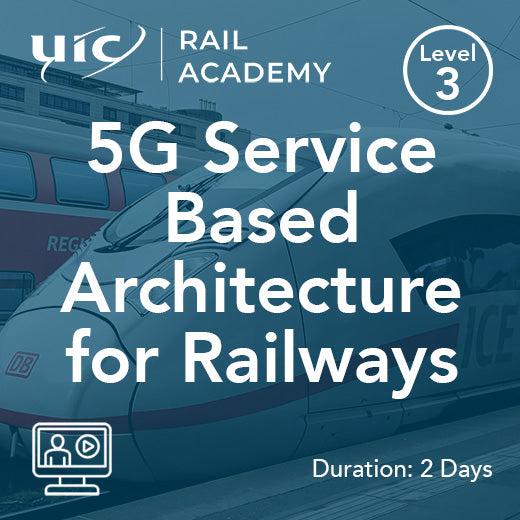
5G Service Based Architecture for Railways
5G Service Based Architecture for Railways training course expores the Core Network Functions , including their overall purpose, their specific role within the SBA, and the features / services that they support. This is followed by a comprehensive survey of the 5G Core and SBA supporting protocols and technologies, as well as a thorough examination of the Service Based Interface (SBI) and Service APIs (Application Programming Interfaces). Example procedures then allow us to build a comprehensive picture of the relevant techniques and features, and to make sense of the way in which the SBA is consistent with, and supports, key 5G enabling principles - including virtualisation and network slicing. Finally, security on the SBI is explored, highlighting the new network functions and techniques that have been introduced with 5G to provide new security features (including the roaming scenario), and a more secure core network domain. With the emergence of FRMCS our 5G Rail portfolio addresses the technical requirements of FRMCS. Who would benefit This course is designed for those involved in the design, deployment and development of the 5G Service Based Architecture and the 5G Core. Prerequisites This is a technical course, so experience or knowledge of the 5G system from a technical perspective would be an advantage. Topic Areas Include 5G Introduction and Deployment Options The 5G Core Network Functions 5G Core Supporting Protocols and Technologies The Service Based Interface (SBI) and Service APIs Explained Procedures Deployment options SBI Security Optional 5G Virtual Lab Module Explore, Test, Optimise, and Troubleshoot the 5G System Deep dive into the key signalling scenarios in the 5G system and analyse the output to build a deeper understanding that goes beyond the theoretical. The lab is a fully emulated 5G System environment that enables you to experiment with the configurations for Network Functions and build customized settings for signalling scenarios that helps you to develop greater insight into the operation of the 5G System. Lab modules can be added to any relevant 5G course. Learn more and arrange a demo.
POA: Private Course
-
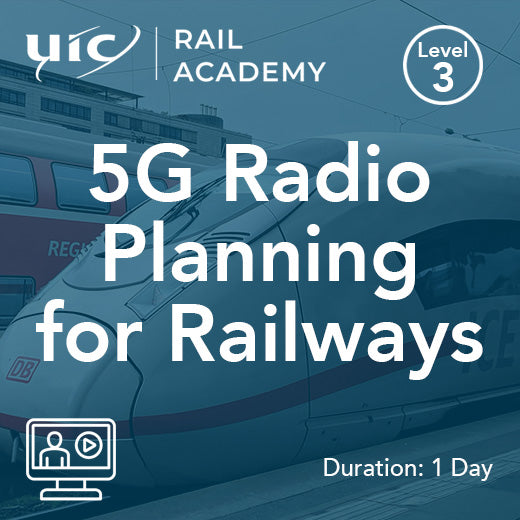
5G Radio Planning for Railways
The heart of any cell planning process begins with coverage and capacity estimations, this 5G Cell Planning for Railways training course will guide you through the variables that impact both coverage and capacity and provides practical worked examples for a variety of scenarios. As well as the planning process it is also important to understand the RF KPIs and measurements that determine link performance, the essential signals and measurement techniques of the NR are covered in this training as well as a detailed look at parameters that affect the random access process, location management and PCI planning. At the conclusion of this training the student will be well versed in the theory and practice of 5G cell planning with a good understanding of both the principles and application of planning techniques. With the emergence of FRMCS our 5G Rail portfolio addresses the technical requirements of FRMCS. Who Would Benefit This course is intended for network planning engineers working in the rail industry, who wish to learn about the issues that are involved when planning radio access networks for 5G FRMCS Prerequisites The course assumes familiarity with telecommunication systems and with the principles of radio network planning gained from planning GSM-R networks. Otherwise, experience gained in network planning for LTE, and knowledge of the 5G air interface, would be beneficial. Topic Areas Include Fundamentals of the 5G Air Interface Link Budget Estimation Coverage Estimation Capacity Estimation RSRP, RSRQ and SINR Parameter Setting
£1,815.00
-
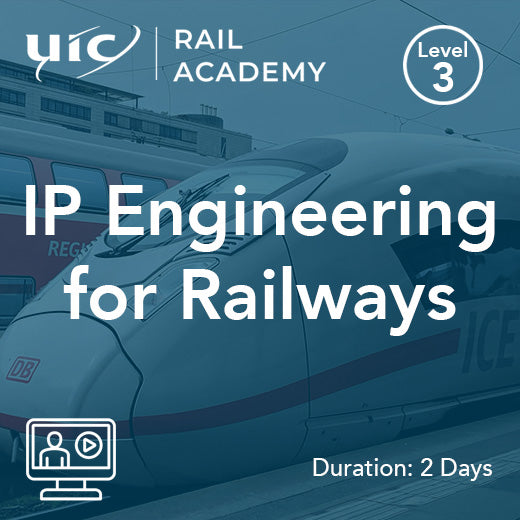
IP Engineering for Railways
IP Engineering for Railways delivers a detailed overview of Internet Protocol networks. Delivering an understanding of Engineering techniques, as well as applications, protocols and switching methods, it enables delegates to work confidently in the IP environment. Other topics explored include QoS, security, VPNS and Multimedia over IP. With the emergence of FRMCS our 5G Rail portfolio addresses the technical requirements of FRMCS. Who would benefit Those needing to understand how IP networks are designed and implemented. Prerequisites Some knowledge or experience of packet-switched data network operation and Internet technology is beneficial. Topic Areas Include Background to the Internet and ISPs The Data Link, IP, Transport and Application layers IPv6 The Domain Name System (DNS) Introduction to MPLS Access services E-mail services and web hosting Name servers Service Provider Network architectures Peering Routing in IP networks Overview of OSPF and BGP4 IP QoS technologies Security engineering IP VPNs IP multimedia services
POA: Private Course
-
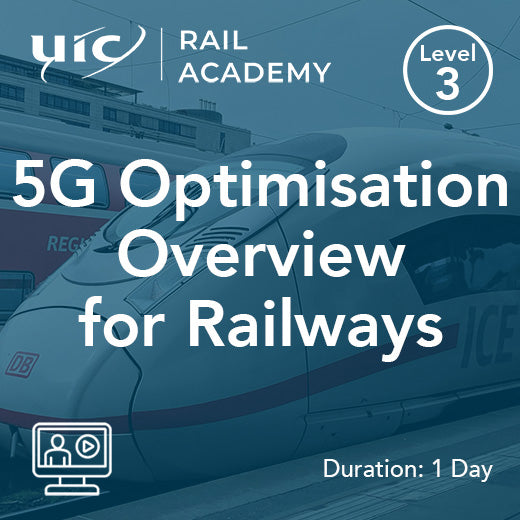
5G Optimisation Overview for Railways
5G Optimisation Overview for Railways provides an introduction to the principles of parameter setting and optimisation in the Next Generation Radio Access Network (NG-RAN). The material covered includes cell configuration, signal measurements, and parameters in idle and connected mode. With the emergence of FRMCS our 5G Rail portfolio addresses the technical requirements of FRMCS. Who Would Benefit? This course is intended for experienced radio access optimisers, and for those involved with device development or functionality testing in 5G systems. Prerequisites The course assumes an engineering background, with some knowledge of digital radio systems in general and the 5G air interface in particular. Experience of parameter tuning and optimisation for LTE would be useful. Course Contents Fundamentals of the 5G Air Interface RSRP, RSRQ and SINR Parameter Setting
POA: Private Course
-
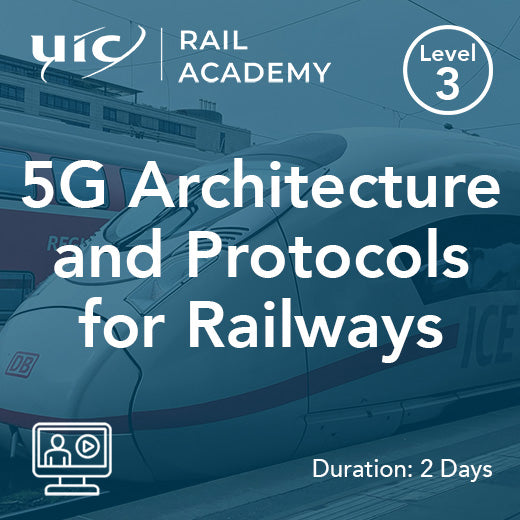
5G Architecture and Protocols for Railways
This 5G Architecture and Protocols for Railways training course is a detailed technical description of the core and radio access networks of 5G. It covers the architecture and interfaces used by 5G, the protocols used for signalling and data transport, the provision of services over a 5G network, and the procedures for signalling and system operation. With the emergence of FRMCS our 5G Rail portfolio addresses the technical requirements of FRMCS. Who would benefit The course is intended for engineers and other staff who are involved with the architecture, optimization, management, monitoring or testing of the 5G network. Prerequisites An engineering background with some knowledge of core and radio access network technologies is assumed. A basic understanding of 5G and experience of LTE networks would be desirable. Topic Areas Include: 5G introduction, use cases and standardisation Radio access network architecture and deployment options Network architectures for dual connectivity Architecture of the 5G core network Network Function virtualisation, slicing and orchestration Interworking and compatibility between 5G, LTE and Wi-Fi PDU connectivity, Quality of Service and service provision Control plane and user plane protocols in the 5G network Implementation of network function services using HTTP/2 Signalling procedures for registration, security and session management Network operation in Idle, Inactive and Connected modes Optional 5G Virtual Lab Module Explore, Test, Optimise, and Troubleshoot the 5G System Deep dive into the key signalling scenarios in the 5G system and analyse the output to build a deeper understanding that goes beyond the theoretical. The lab is a fully emulated 5G System environment that enables you to experiment with the configurations for Network Functions and build customized settings for signalling scenarios that helps you to develop greater insight into the operation of the 5G System. Lab modules can be added to any relevant 5G course. Learn more and arrange a demo.
POA: Private Course
-
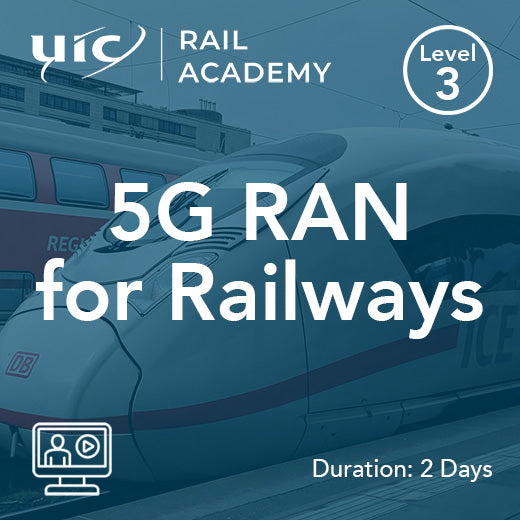
5G Radio Access Network for Railways
The 5G Radio Access Network for Railways course begins by discussing the key features of a 5G network before delving into the finer detail of the 5G New Radio. The 5G RAN is described in terms of network architecture, base station characteristics, spectrum usage and multiple antenna configurations. The transport of signalling and traffic over the 5G RAN interfaces, fronthaul and backhaul are analysed followed by an in depth study of the signalling protocols used over those interfaces. With the emergence of FRMCS our 5G Rail portfolio addresses the technical requirements of FRMCS. Who Would Benefit Engineers that need to know about the 5G Radio Access Network in terms of its characteristics, architecture, interfaces and operation Pre-requisites Ideally attendees will have a mobile telecommunications or radio background gained from the study of or working with GSM, UMTS or LTE networks. Topic Areas Include Introduction to 5G 5G RAN NG Interface Messages and Procedures Xn Interface Messages and Procedures E1 Interface Messages and Procedures F1 Interface Messages and Procedures Multi-RAT Dual Cennectivity Optional 5G Virtual Lab Module Explore, Test, Optimise, and Troubleshoot the 5G System Deep dive into the key signalling scenarios in the 5G system and analyse the output to build a deeper understanding that goes beyond the theoretical. The lab is a fully emulated 5G System environment that enables you to experiment with the configurations for Network Functions and build customized settings for signalling scenarios that helps you to develop greater insight into the operation of the 5G System. Lab modules can be added to any relevant 5G course. Learn more and arrange a demo.
POA: Private Course
-
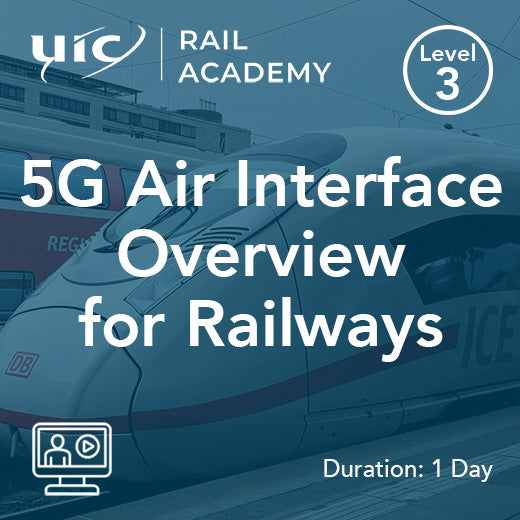
5G Air Interface Overview for Railways
This 5G Air Interface Overview for Railways course is a technical introduction to the 5G New Radio. The course includes the design goals and development schedule for 5G, and the principles, design and implementation of the 5G air interface. With the emergence of FRMCS our 5G Rail portfolio addresses the technical requirements of FRMCS. Who would benefit This course is intended for engineers either new to, or already working in, mobile radio communications. Prerequisites Familiarity with telecommunications and general engineering terminology is assumed. Some understanding of LTE cellular systems would be beneficial. Topic Areas Include: 5G introduction, key features and standardisation Use cases and performance objectives Non-standalone and standalone deployment options Radio spectrum and millimetre wave communications Principles of radio transmission and reception in 5G Multiple antennas in 5G Air interface protocol stack Architecture of the air interface physical layer Procedures for data transmission and reception on the 5G air interface
POA: Private Course
-
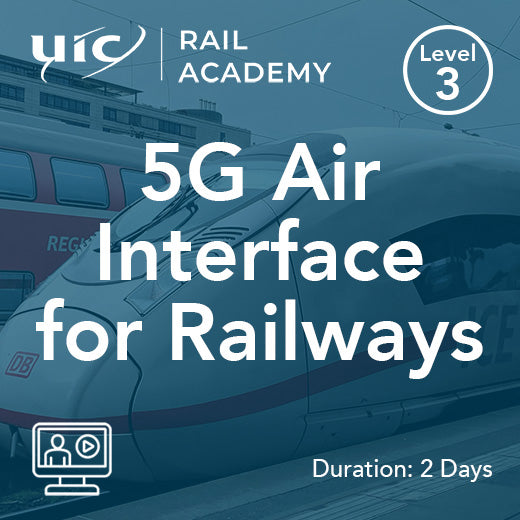
5G Air Interface for Railways
This 5G Air Interface for Railways training course is a detailed technical description of the air interface for the 5G New Radio (5G NR). It covers the principles of millimetre wave and multiple antenna communications, the architecture and implementation of the air interface’s physical layer, the higher layer air interface protocols, and the signalling procedures for idle and active 5G devices. With the emergence of FRMCS our 5G Rail portfolio addresses the technical requirements of FRMCS. Who would benefit The course is intended for engineers and other staff who are involved with equipment design, operation, optimization or monitoring on the 5G air interface. Prerequisites An engineering background with some knowledge of general radio principles and digital radio systems is assumed. A basic understanding of 5G and experience of LTE radio systems would be desirable. Topic Areas Include: 5G introduction, use cases and standardisation Radio spectrum and millimetre wave communications Principles and implementation of multiple antennas in 5G Architecture of the air interface physical layer Details and implementation of the 5G physical, transport and logical channels Air interface procedures for synchronisation, scheduling, data transmission, feedback and random access Dual connectivity architecture and protocol stacks
POA: Private Course
-
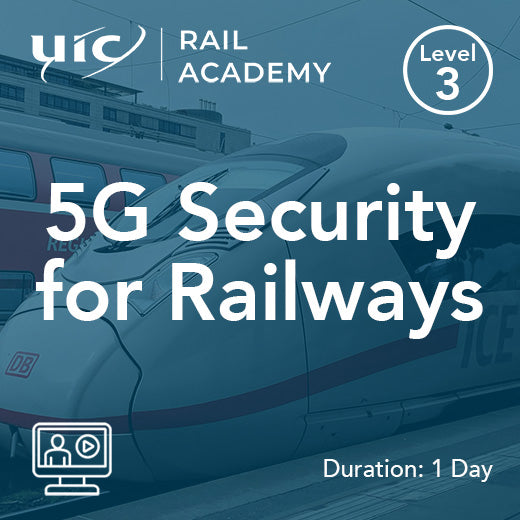
5G Security for Railways
The nature of 5G means that the security architecture and processes need to cover new aspects (when compared to previous 3GPP generations), including 5GNR/LTE Dual Connectivity, standardized interfaces for distributed gNB / RAN architectures, more tightly integrated Non-3GPP Access, and most significantly, the new Service Based Interfaces used within the 5G Core. The 5G Security for Railways course provides a comprehensive grounding in this expanded set of security requirements and mechanisms used in 5G. We start by considering the 5G architecture in order to better understand the overall security requirements for both the UE and network. We then build on the security architecture of 4G LTE, with relevant modifications and additions required for 5G, before focusing squarely on the additional features and procedures required to secure the 5G Core Network (Service Based Interface). With the emergence of FRMCS our 5G Rail portfolio addresses the technical requirements of FRMCS. Who would benefit This course is designed for engineers, managers and other personnel who have a need to acquire a technical overview of the security environment employed within 5G networks. It will also be of benefit to those in the wider technical community who have a need to understand the security protocols employed by advanced cellular networks. Prerequisites An understanding of 4G (and legacy 2G and 3G) security procedures would be an advantage as would a basic understanding of 5G and / or LTE network architecture and functionality. Topic Areas Include 5G Architecture and the Service Based Interface 5G Security Architecture and Authentication and Key Agreement Security and the Service Based Interface (including SEPP)
POA: Private Course
-
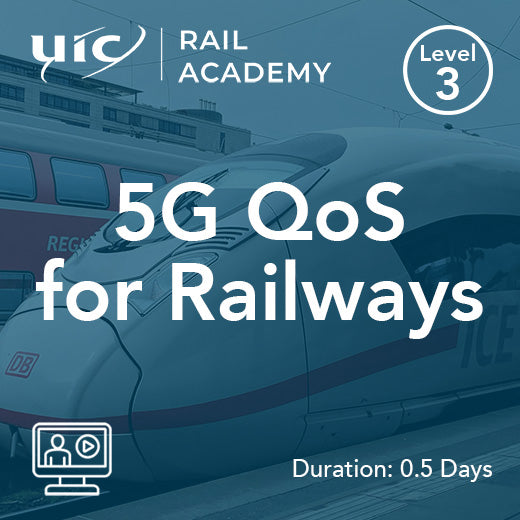
5G QoS for Railways
5G QoS for Railways is designed for those involved in the QoS and charging management and operations in 5G Standalone Networks Prerequisites The focus of this course is only on the PCC framework as specified by 3GPP thus participants should be familiar with 5G operations and general features prior to attending this training. Course Contents 5G PCC Framework Architecture 5G QoS Model Access and Mobility Association Session Management Policy Association AF Influence on Policy Decisions PCF Selection PCC Rules and PCC Rule handling
POA: Private Course
-
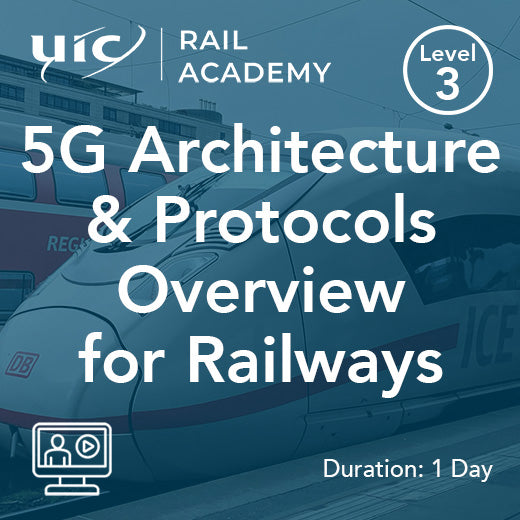
5G Architecture and Protocols Overview for Railways
This 5G Architecture and Protocols Overview for Railways course is a technical introduction to the 5G network. The course includes the design goals and development schedule for 5G, the principles, design and implementation of the core and radio access networks of 5G. With the emergence of FRMCS our 5G Rail portfolio addresses the technical requirements of FRMCS. Who would benefit This course is intended for engineers either new to, or already working in, mobile communication networks. Prerequisites Familiarity with telecommunications and general engineering terminology is assumed. Some understanding of LTE cellular systems would be beneficial. Topic Areas Include: 5G introduction, key features and standardisation Use cases and performance objectives Radio access network architecture and protocols Non standalone and standalone deployment options Core network architecture and protocols Network function virtualisation and network slicing Interworking and compatibility between 5G, LTE and Wi-Fi PDU connectivity, Quality of Service and service provision Signalling procedures in the 5G network
POA: Private Course
-
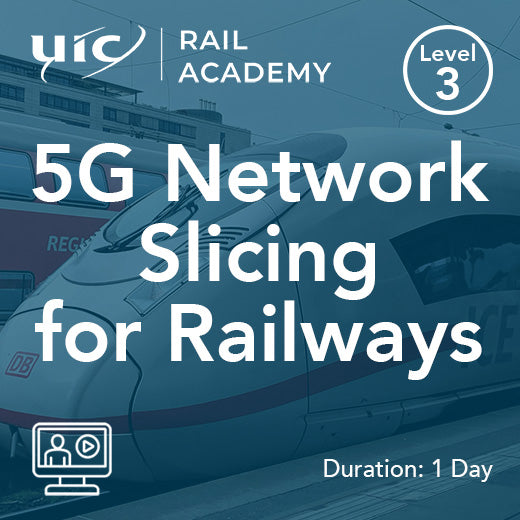
5G Network Slicing for Railways
This 5G Network Slicing for Railways course examines 5G network slicing and those topics that impact and drive slice strategy. Service and Industry requirements are explored, as well as use case performance objectives. Technical aspects of 5G slice operation are followed by an appraisal of the techniques available to map the requirements onto a practical slice. A generic slice template, and associated attributes, are then used to generate an example slice specification. Finally, practical slice deployment and management options are investigated. Examples are used throughout. With the emergence of FRMCS our 5G Rail portfolio addresses the technical requirements of FRMCS. Who would benefit This course is designed for those involved in the design, deployment and commercialisation of 5G. Prerequisites Although we begin with an introduction to 5G and use case requirements, the course focuses on the technical aspects of network slicing, so some experience or knowledge of the 5G system from a technical perspective would be an advantage. Topic Areas Include Introduction to 5G, Use Cases and Connectivity 5G Slicing Slice Development and Deployment Optional 5G Virtual Lab Module Explore, Test, Optimise, and Troubleshoot the 5G System Deep dive into the key signalling scenarios in the 5G system and analyse the output to build a deeper understanding that goes beyond the theoretical. The lab is a fully emulated 5G System environment that enables you to experiment with the configurations for Network Functions and build customized settings for signalling scenarios that helps you to develop greater insight into the operation of the 5G System. Lab modules can be added to any relevant 5G course. Learn more and arrange a demo.
POA: Private Course
-
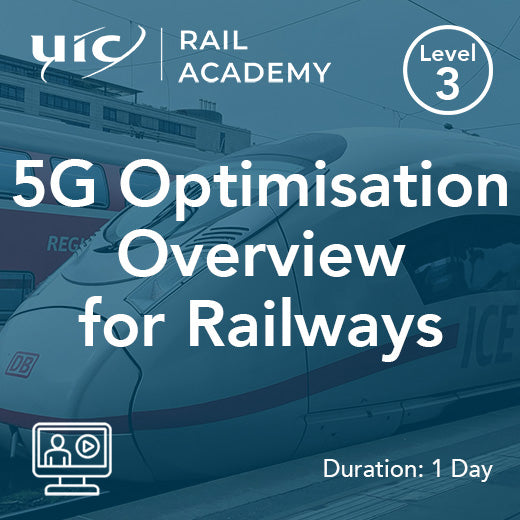
5G Engineering Overview for Railways
This 5G Engineering Overview for Railway course is a technical overview of 5G. The course includes the design goals and development schedule for 5G, and the principles and architecture of the 5G air interface, radio access network and core network. With the emergence of FRMCS our 5G Rail portfolio addresses the technical requirements of FRMCS. Who would benefit This course is intended for engineers either new to, or already working in, mobile communications. Prerequisites Familiarity with telecommunications and general engineering terminology is assumed. Some understanding of LTE cellular systems would be beneficial. Topic Areas Include 5G introduction and key features Standardisation and timelines for 3GPP and the ITU Use cases and performance objectives Radio spectrum and millimetre wave communications Principles of radio transmission and reception in 5G Radio access network architecture Non standalone and standalone deployment options Core network architecture Network function virtualisation and network slicing Interworking and compatibility between 5G, LTE and Wi-Fi
POA: Private Course
-
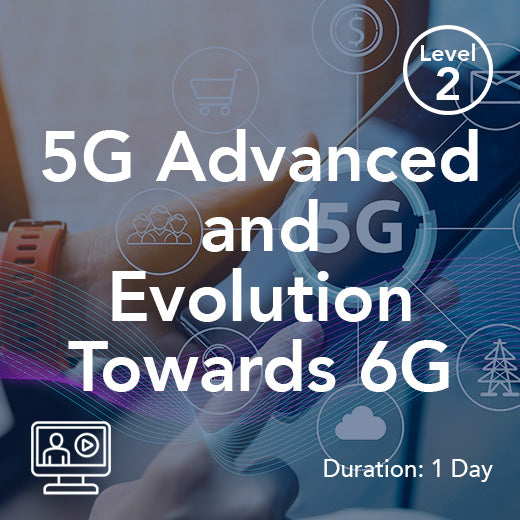
5G Advanced and Evolution Towards 6G
This 5G Advanced and Evolution Towards 6G course delves into 5G Advanced and its role as a stepping stone to the groundbreaking 6G era. You'll explore how 5G is being enhanced to deliver even higher speeds, lower latency, and greater capacity. We'll dissect key features and advancements that are laying the groundwork for the future of connectivity. Beyond 5G, the course will provide a glimpse into the potential of 6G, examining emerging technologies and their implications for industries and society. The course provides a holistic overview of the current (relatively early) state of play of 6G development. We develop crucial insights into 6G design, performance objectives, and its intersection with the metaverse and AI, ensuring participants are well-prepared for the future of wireless communication. By the end of this course, you'll gain a comprehensive understanding of the latestdevelopments in mobile network technology and the exciting possibilities they hold. Who Would Benefit Although this course is open to all, it is recommended that you have prior experience in telecommunications. Course Contents 5G Advanced - Base Capabilities Improvements Specific 5G Advanced Features 6G – a Look Ahead
£980.00
-

Artificial Intelligence (AI) Fundamentals for Telecoms
The Artificial Intelligence Fundamentals course is designed to provide participants with a comprehensive introduction to the field of artificial intelligence (AI). Through a combination of theoretical concepts and practical applications, participants will gain a solid foundation in AI and its various subfields, including machine learning, natural language processing, computer vision, and robotics. We explore the use of AI in industry, and in particular in Telecoms and related sectors. By the end of the course, participants will have a strong grasp of AI concepts, techniques, and their real-world applications – particularly in telecoms. They will be equipped to pursue further studies in AI or apply their knowledge to diverse domains where AI plays a significant role. Prerequisites There are no specific prerequisites for this course. However, a basic understanding of programming concepts would be beneficial. Course Contents Introduction to Artificial Intelligence Machine Learning Natural Language Processing (NLP) Computer Vision Robotics and Autonomous Systems AI in Industry Ethics and Responsible AI
POA: Private Course
-
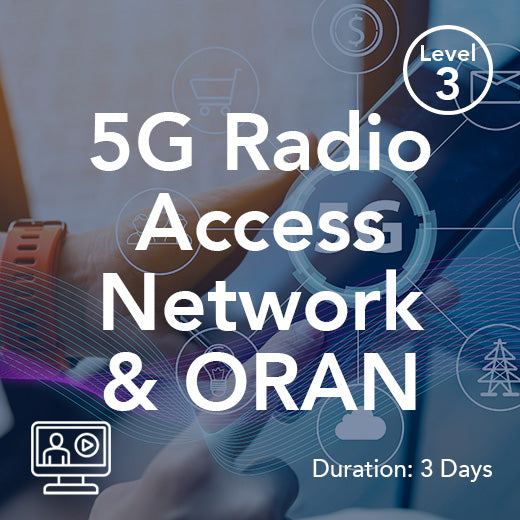
5G Radio Access Network & ORAN
This three-day course offers a comprehensive exploration of both 5G Radio Access Networks (RAN) and Open Radio Access Networks (ORAN). Participants will gain a deep understanding of the key features of a 5G network, including the 5G New Radio and the architecture, characteristics, and spectrum usage of the 5G RAN. The course also covers the transport of signalling and traffic over the 5G RAN interfaces, as well as an in-depth study of the signalling protocols used. In addition, participants will receive a solid introduction to Open RAN, learning about its purpose, features, architecture, operation, and deployment options. The course also explores how ORAN principles, rooted in virtualisation, support the evolution to 5G and the impact of using ORAN architecture on open and standardised interfaces. This course is ideal for those in or entering technical roles in a mobile network operator's Radio Access Network (RAN) environment. Overall, this course provides a comprehensive overview of 5G RAN and ORAN, equipping participants with the knowledge and skills needed to excel in technical roles within the mobile network industry. With a focus on both theoretical concepts and practical applications, participants will gain valuable insights into the latest developments in 5G technology and its impact on network architecture and operations. Who Would Benefit Those in or entering technical roles in a mobile network operators Radio Access Network (RAN) environment. Course Modules: Introduction to 5G The Next Generation Radio Access Network Signalling Protocols in the NG-RAN Signalling Procedures in the NG-RAN 5G Releases 16 to 18 Radio Access Networks ORAN Players 3GPP RAN Architecture for 5G O-RAN Architecture and Operation Whitebox Base Stations
£2,660.00
-

Air Blown Fibre
"Introduction to Air Blown Fibre" is a foundational online course designed to introduce participants to the principles and practices of air blown fibre technology. This course covers the basics of fibre optic networks, the advantages of using air blown fibre, and the essential techniques for installation and maintenance. Ideal for telecommunications professionals and network technicians, this course provides the knowledge and skills needed to understand and implement air blown fibre solutions effectively. Course Contents Introduction to Fibre Blowing Technology: Overview of fibre optic networks Introduction to fibre blowing and its benefits Comparison with traditional installation methods Key components of a fibre-blowing system Equipment and Materials: Fibre blowing machines: types and selection criteria Fibre optic cables: types, characteristics, and applications Tube bundles Blowing mediums: compressed air and water Accessory tools and safety gear Preparation and Setup: Site preparation and assessment Setting up the fibre blowing machine Pre-installation checks and maintenance Ensuring a safe working environment Fibre Blowing Installation Procedures: Step-by-step guide to fibre blowing Techniques for optimal cable installation Handling different types of duct routes Ensuring minimal friction and optimal speed Troubleshooting and Maintenance: Common issues in fibre blowing installations Diagnostic techniques and solutions Regular maintenance practices for equipment Ensuring long-term performance and reliability Quality Assurance and Standards: Industry standards and regulations Documentation and reporting Final inspection and testing
POA: Private Course
-

Fibre Optic Splicing and Termination
Designed for both beginners and experienced technicians, this course provides a thorough understanding of fibre optic technology. It focuses on splicing and termination techniques essential for reliable network performance. Course Contents Introduction to Fibre Optics: Overview of fibre optics technology Types of fibre optic cables and their uses Basic principles of light transmission in optical fibres Fibre Optic Network Architectures: Essential tools for splicing and termination Safety equipment and precautions Maintenance and care of fibre optic tools Fibre Optic Splicing Techniques: Types of splicing: fusion splicing and mechanical splicing Step-by-step guide to fusion splicing Mechanical splicing procedures and applications Splicing best practices and common pitfalls Fibre Optic Termination Methods: Overview of termination techniques Types of connectors and their applications Step-by-step guide to connector installation Termination best practices and troubleshooting Testing and Troubleshooting: Importance of testing in fibre optic installations Types of tests: continuity, insertion loss, and OTDR testing Interpreting test results Common issues and troubleshooting methods Identifying contaminated/worn connectors
POA: Private Course
-

Introduction to Telecoms Regulation
This 1-day course on Introduction to Telecoms Regulation covers all aspects of regulation in the telecommunications industry. Participants will gain an understanding of the three different types of regulation and how they impact the industry's structure, services offered, competitive environment, prices, and consumer choice and protection. By attending this course, participants will gain insights into the key regulatory frameworks governing the telecommunications sector and how to navigate them effectively. Course contents include an introduction to regulation, regulation for competition, licensing and authorization, spectrum regulation, and consumer protection. By the end of the course, participants will have a comprehensive understanding of the regulatory landscape in the telecommunications industry and how to ensure compliance while maximizing business opportunities. Who Would Benefit Anyone involved in business decisions working in a firm which is subject to regulation or competition law constraints including finance, pricing, and sales & marketing teams. Course Contents Introduction Regulation for Competition Licensing and Authorisation Spectrum Regulation Consumer Protection
POA: Private Course
-
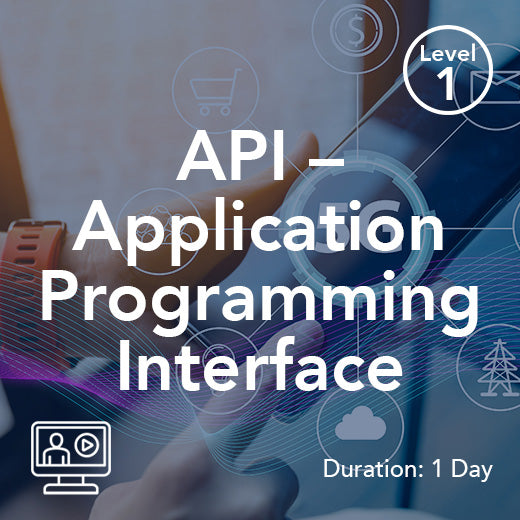
API – Application Programming Interface
For those looking to gain a comprehensive understanding of APIs and their application in Web Services and 5G Core Networks, the 1-day API Application Programming Interface course offered by Wray Castle is the perfect choice. This course is designed for individuals who want to delve into the intricacies of API standards, definitions, and their relevance in the realm of Web Services and 5G technology. Led by seasoned telecommunications trainer Maziar Shoaie, participants will explore topics such as 3GPP and 5G APIs, as well as the fundamentals of 5G Service Based Architecture (SBI). Participants are encouraged to have some prior knowledge or experience in packet-switched data network operations and Internet technology, along with a general understanding of 4G and 5G networks. Through a combination of theoretical learning and practical insights, attendees will gain valuable insights into the world of APIs and their significance in modern telecommunications. Join us for this intensive 1-day course and enhance your understanding of APIs in the context of Web Services and 5G Core Networks. Prerequisites Some knowledge or experience of packet-switched data network operation and Internet technology is beneficial. General knowledge about 4G and 5G. Course Contents Introduction to API API Standards and Definition API and Web Services 3GPP and 5G APIs 5G Service Based Architecture (SBI) Course Director: Maziar Shoaie Maziar is a seasoned telecommunications trainer with over 23 years of experience. He has delivered courses in more than 45 countries to customers from all over the world, including operators, vendors, and integrators. He is a core-network specialist with expertise in 2G, 3G, 4G, and 5G networks. and the developer of the Wray Castle 5G Lab and Workshop.
£980.00
-

Fundamentals of Telecommunications
This course will cover a wide range of topics, starting with the basics of services and connectivity. It will provide insight into the evolution of telecommunication networks over time, reflecting on both historical advancements and future trends. We will begin with an introduction to the foundational aspects of telecom services and connectivity, setting the stage for more detailed explorations. We will then delve into fixed access technologies, starting with traditional copper pair connectivity and progressing through the evolutionary phases of fixed broadband access. This will include a thorough discussion of the technologies that have shaped and continue to influence fixed network landscapes. The mobile sector will receive a focused analysis beginning with the fundamental cellular concepts. We will explore the evolution of mobile broadband, especially under the frameworks established by the 3rd Generation Partnership Project (3GPP), covering technologies from GSM to advanced LTE and 5G networks. An essential component of this course will be a deep dive into operational support systems (OSS) and business support systems (BSS), which are critical for managing modern telecommunications services. We will examine the key platforms that support telecom services, such as billing, customer service, and network management systems. The course will also cover the burgeoning area of the Internet of Things (IoT), detailing how this technology integrates into existing telecom infrastructures and the new opportunities it creates. Additionally, we will consider the infrastructure backbone of the telecom industry, focusing on data centres and the relative costs associated with telecom infrastructure, excluding spectrum costs. Course Contents: Introduction Services and Connectivity - Evolution Fixed Access Mobile Access Support Systems Infrastructure
POA: Private Course
-
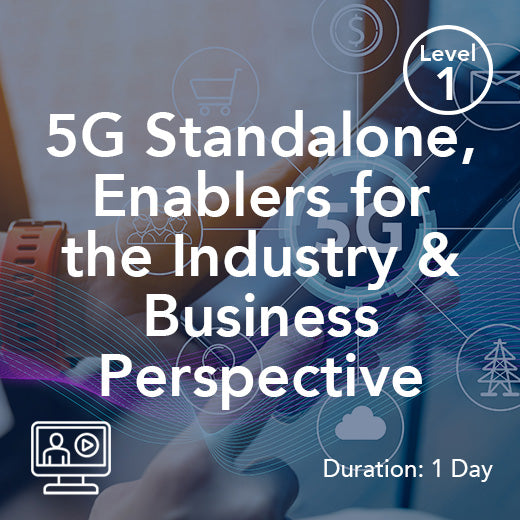
5G Standalone, Enablers for the Industry & Business Perspective
With SA 5G, we witness the evolution of mobile networks, from being reliant on legacy infrastructure, to achieving true independence - and unlocking unprecedented capabilities that enables 5G to support a much wider range of industrial use cases. In this course, we guide you through the benefits and challenges of deploying Standalone 5G, exploring its architectural advancements, unique features, and the benefits it brings to both consumers and businesses. We then highlight the enhanced capabilities and expanded use cases made possible by key technology enablers - including network slicing, edge computing, virtualization, non-terrestrial networks (NTNs), network exposure, and network automation. We discuss the impact of 5G SA for network operators, service providers, and enterprises - exploring the opportunities and challenges that arise in the deployment and management of advanced 5G networks. Who Would Benefit Ideal for anyone needing clarity on 5G trajectory – including capabilities & use cases Prerequisites A basic appreciation of the telecoms landscape – both technical and business Course Contents 5G Base Capabilities A Business Perspective 5G Standalone (SA) 5G Enablers for Industry
POA: Private Course
-

Essential 5G Protocols and Procedures (On-Demand Virtual Lab)
In this lab-based course, you will dive deep into the essential 5G protocols, with a specific focus on the 5G NF Framework, registration processes, and PDU session establishment. Through a series of interactive lab sessions, you'll gain invaluable experience and a comprehensive understanding of critical aspects of the 5G system.This course is tailored for individuals and organisations keen on mastering the operational intricacies of 5G systems. Whether you work for a public or private mobile network operator, network equipment vendor, test equipment vendor, handset manufacturer, regulator, or integrator, this course is universally relevant.This course is uniquely designed to be lab-based, ensuring that theoretical concepts are immediately put into practice. Through a series of interactive labs, participants will gain not only theoretical knowledge but also the practical skills necessary to navigate the dynamic world of 5G protocols and procedures. Course Structure Gain a comprehensive understanding of the 5G NF Framework, 5G registration and 5G PDU Session Establishment procedure’s including: 5G NF Registration Registration Message Flow Next Generation Application Protocol 5G AKA (Authentication and Key Agreement) Subscriber Data Handling AM (Access and Mobility) Policy Association 5G Session Establishment PFCP (Packet Forwarding Control) Protocol Who Would Benefit? The standardised nature of the lab makes it suitable for any organization interested in 5G System operation and function including. It is of particular interest to those in the following roles: Engineers working with Operation, Optimisation and Troubleshooting System Engineers and Integrators Or anyone who needs to explore and understand the 5G Core Network signalling Lab Features & Benefits Through a combination of hands-on experience and guided instruction our virtual labs allow users to explore signalling procedures in the 5G system. Our labs feature: A simulated 5G network - Provides hands-on experience and reinforces theoretical knowledge. Wireshark (pcap) output files – detailed output files provide deep system insight. Illustrated Course Books - featuring leading edge knowledge from subject matter experts. Videos - Detailed videos discuss topics in greater depth. Guided exercises for signalling scenarios - makes learning and applying new concepts straightforward. Ongoing trainer support - ensures you get expert advice when needed.
£1,140.00
-

Basics of Carbon Capture and Storage (On-Demand)
The Basics of Carbon Capture and Storage course covers: the role of CCS within decarbonisation as an aspect of earth system science; why CCS is necessary; how CO2 is captured in industrial processes and how it can be used industrially; the factors affecting geological storage; how CO2 stores are monitored for leakage; how CCS will be regulated; how CCS will pay for itself; and the social licence for CCS. The course will be delivered in simple non-technical language suitable for non-specialists. The course satisfies a part of the market that is not currently catered for – the wider science, risks, financing, planning and social licence aspects of CCS. These are issues that are as important as the technical issues (in, for example, reservoir engineering) in the sense that any of these elements can be a show-stopper for CCS. Although the course will cover the technical geological and engineering aspects of CCS, it will also consider how these technical, policy and science aspects affect planning, regulation and financing of CCS. There are geologists, planners, investors and policy makers in companies, government natural resource and planning departments, investment banks and among NGOs that require this information from an unbiassed technically well informed and up to date source. This course provides that source.Who would benefit? The course is designed for geologists, geological planners and regulators, investors and policy makers in energy companies, government natural resource and planning departments, investment banks and NGOs that require information from an unbiassed, technically well informed and up to date source. What people need in advance No particular prior knowledge needed beyond normal levels of expertise in applied geoscience. As stated above, the course is aimed at geological generalists in energy companies, government natural resource and planning departments, investment banks and NGOs. Course Modules: Introduction The geological carbon cycle and anthropogenic influences on the geological carbon cycle Capturing, transporting and using carbon dioxide Geological Storage Regulation, finance, policy and public perception Present state of global CCS Course Director: Prof Mike Stephensen Mike has 25 years’ experience in energy and geological science, including 8 years national level science leadership in the UK. Mike has been providing geoscience advice to Government for almost 15 years and has an excellent overview of Government policy, industrial activity and funding landscape in applied and energy geoscience. Mike also has expertise in positioning organisations in controversial energy topics e.g. CCUS, shale gas and nuclear. Mike was adviser to UK Government Chief Scientist on shale gas and CCUS in 2016; a member UKRI’s Energy Strategic Advisory Committee 2020 to 2021; and a Member of the UK Government’s Hydrogen Advisory Council 2021. Widely recognised as an excellent scientist, he has over 100 peer-reviewed scientific papers including many on CCUS, and ~200 conference abstracts. He is Visiting Professor at the University of Nanjing, China, and the University of Milan, Italy, and has been Honorary Professor at Nottingham and Leicester universities, UK Mike is a well-known communicator of science and has published three single-author popular science books. His book on CCUS ‘Returning Carbon to Nature’ is widely seen as the go-to introductory text on CCUS. Follow Mike on LinkedIn.
£980.00
-
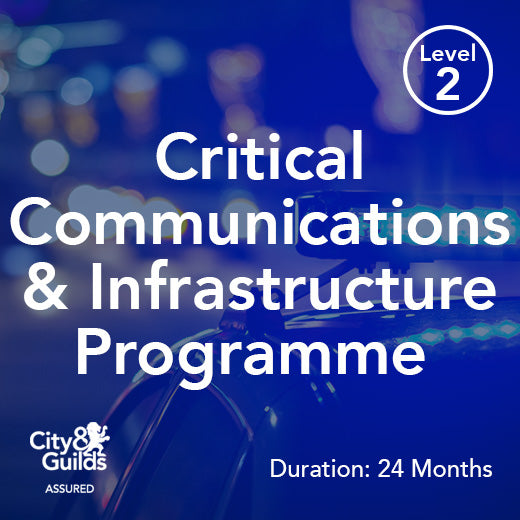
Critical Communications & Infrastructure Programme (Emergency Services Track)
The Critical Communications and Infrastructure Programme (Emergency Services Track) is a comprehensive programme designed to equip professionals in the Emergency Services with the essential knowledge and skills to excel in their roles. The programme aims to provide participants with a holistic understanding of critical communication technologies, strategic insights, and practical skills to navigate the complexities of the ecosystem. This programme has been assured by City & Guilds. Assured status provides validation and recognition for the learner. It is a symbol of learning excellence and quality and is a reassurance that the training undertaken meets best practice standards. Critical Communications & Infrastructure Programme (Emergency Services Track) Syllabus Foundation Courses Technology Fundamentals Course Modules: Defining Telecoms Background to the Telecom Network Digital Fixed Telecom Networks Data Networks Mobile Networks and Wi-Fi Broadband and Emerging Networks 2G to 5G Mobile Technologies Course Modules: Principles of Mobile Cellular Networks 2nd Generation Mobile Networks 3rd Generation Mobile Networks 4th Generation Mobile Networks 5th Generation Mobile Networks Radio Principles Course Modules: A Need for Radio Frequency and Bandwidth Modulation Radio Spectrum Antennas and Transmission Lines Propagation Radio Coverage Radio Interference Analogue and Digital Systems Specialist Courses LTE Mission Critical Communications Course Modules: Requirements of a Mission Critical Network The LTE Radio Interface Multimedia Broadcast Multicast Service The IP Multimedia Subsystem (IMS) Group Communication System Enablers Mission Critical Push to Talk Mission Critical Video Mission Critical Data LTE and LMR Interworking LTE Engineering Course Modules: Introduction to LTE OFDMA Physical Layer Access Stratum Protocols LTE UEs and Access Networks LTE Core Networks LTE Operation LTE Release 9 and Beyond 5G Engineering Course Modules: Introduction to 5G Principles of the 5G New Radio 5G Air Interface 5G Network Architecture 5G Procedures Releases 16 and 17 About City & Guilds City & Guilds is a household brand and a global leader in skills development. Over one million people earn a City & Guilds qualification every year, providing them with the skills they need to thrive in the workplace.In the global economy, the ability to compete depends on building a skilled, competent and confident workforce. City & Guilds understands the value of portable skills and globally recognised standards that enable people and organisations to succeed. It partners with Governments, employers and educators in over 50 countries, across five continents, to advise them on developing high-quality skills training that meets the needs of the global workforce, without compromising on local demands. Enrolment Fees: £2,995 (+VAT) Programme Duration: 24 months (Programme is On-Demand, learners can start at any time) Bespoke In-Company Schemes The Critical Communications and Infrastructure Programme provide the ideal structure for formalising training programmes for teams across your business. Contact us on info@wraycastle.com for more information.
£2,995.00
-
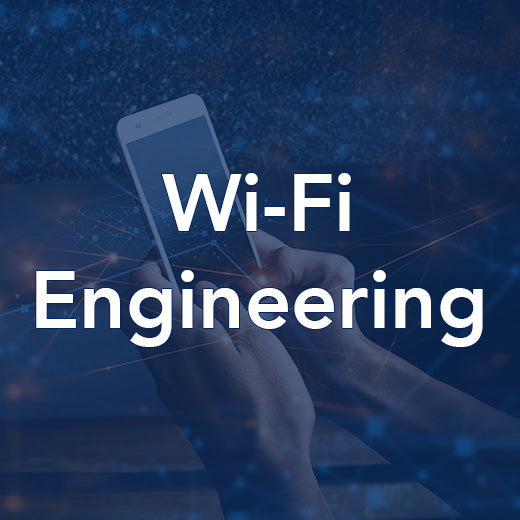
Wi-Fi Engineering Overview (On-Demand)
This Wi-Fi Engineering Overview course provides a comprehensive understanding of the 802.11 family of wireless LAN technologies, commonly known as Wi-Fi. Participants will gain insights into the different forms of Wi-Fi networks currently in use, as well as a detailed examination of the structure, operation, and functionality of Wi-Fi connections. The course also covers essential security mechanisms to safeguard Wi-Fi networks and addresses common Wi-Fi problems and troubleshooting techniques. Ideal for communications professionals involved in Wi-Fi network design, administration, deployment, and maintenance, this course equips participants with the knowledge and skills needed to effectively manage Wi-Fi-based systems. While a background in telecommunications or Information Technology is beneficial, individuals with a keen interest in technology can also benefit from this course. Key topic areas covered in this course include Wireless LAN Technologies and Standards, 802.11 PHY, MAC Frame Structures, MAC Procedures, Security measures, and Wi-Fi Troubleshooting. By the end of the 2-day course comprising 4 live online sessions, participants will have a solid foundation in Wi-Fi engineering and be better equipped to handle the complexities of Wi-Fi networks. Course Summary This course presents an overview of the 802.11 family of wireless LAN technologies that are more commonly known as Wi-Fi. The course introduces the various forms of Wi-Fi currently in use and looks in detail at the structure, operation and functionality of Wi-Fi connections. It then examines the security mechanisms required to protect a Wi-Fi network. Consideration is also given to identifying common Wi-Fi problems and how to correct those issues in a Wi-Fi network. Who would benefit This course is suitable for communications professionals that will engaged in Wi-Fi network design and administration, and also those involved in deploying and maintaining Wi-Fi-based systems. Prerequisites Delegates should ideally have a background in telecommunications or Information Technology with an interest in technology. Topic Areas Include Wireless LAN Technologies and Standards 802.11 PHY MAC Frame Structures MAC Procedures Security Wi-Fi Troubleshooting On-Demand Online Training Our self-paced on-demand distance learning programmes are accessible on any computer, tablet or smartphone and allow you to study at a time and location that is convenient to you. Each course includes: Illustrated Course Books - featuring leading edge knowledge from subject matter experts. Videos - Detailed videos expand the points covered in the course books, discussing topics in greater depth. Tutor Support – Dedicated course tutors are available to answer any questions you might have throughout your studies. Formative Assessment - Modules include regular quizzes to support learning by testing your knowledge of the subject matter. Certification– Successfully complete the end of module tests to earn Digital Badges to demonstrate the depth of your knowledge of the topic.
£1,815.00
-

TowerCo Master Services Agreements (MSA)
A concise course on interpreting TowerCo Master Services Agreements, focusing on telecommunications industry contracts. While this course is not a substitute for legal advice, it will empower you to understand and navigate these complex agreements, covering topics from the importance of contracts to verifying agreement accuracy, contract validity, proactive contract management, and an in-depth exploration of typical contract sections. By the end of this course, you'll be equipped to make informed decisions and safeguard your organisation's interests. Course Contents: Contractual fundamentals Jargon buster approach Cellsite outsourcing in context Importance of proactive contract management to avoid costly disputes Generic form of a TowerCo Master Services Agreement Authority Matrixes
POA: Private Course
-
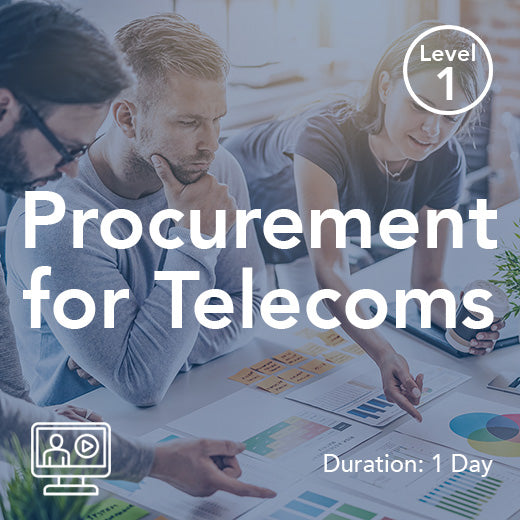
Procurement for Telecoms
Procurement plays a vital role in the telecommunications industry, ensuring the efficient and cost-effective acquisition of goods and services necessary for operations. With the rapid pace of technological advancements and evolving customer demands, telecom companies rely on procurement professionals to source and negotiate contracts for network infrastructure, equipment, software, and services. Effective procurement strategies can help telecom companies optimize their supply chains, control costs, and ensure efficient delivery of products and services. Furthermore, the procurement function involves managing vendor relationships, conducting market research, and staying updated on industry trends to drive innovation and maintain a competitive edge in this dynamic sector. The one-day Procurement for Telecoms course will enable you to build a better understanding of the key concepts and strategies in procurement and apply these concepts to your own organization. Prerequisites A basic understanding of business concepts and operations within the telecoms industry would be helpful, as would some familiarity with emerging Industry trends. Who would benefit? This training course would benefit telecoms executives or managers who work in, or have an interest in, the procurement process within telecoms and related organisations. Course Modules: Concepts of Procurement in Telecoms Supplier Strategy Identifying Potential Category Specific Procurement Levers Implementing a strategy CSR and Carbon Neutral for Procurement in Telecoms Course Director: Tim Williams Tim is a seasoned professional with extensive experience in procurement and supply chain management, his expertise spans strategic procurement advisory, procurement transformation, stakeholder management, and driving improvements in procurement functions. Tim is a Fellow of the Chartered Institute of Purchasing and Supply and has held significant leadership roles including: Senior Advisor to a Major Strategic Global Consultancy Chief Procurement Officer MTN Group (Location Dubai) Director of SCM Transformation and Services Procurement, Vodafone Procurement Company Head of Supply Chain Transformation Vodafone Group
POA: Private Course
-

SMS Messaging
SMS messaging is a crucial component of modern communication systems, and understanding its intricacies is essential for anyone working in the telecom industry. Our SMS Messaging course offers a comprehensive overview of SMS technology, its operations, and the challenges it presents. From exploring the SMS ecosystem to delving into message routing and protocols, participants will gain a solid understanding of how SMS messaging functions. One of the key focuses of the course is on the challenges and vulnerabilities associated with SMS messaging, including issues such as spam, fraud, and security threats. Participants will learn effective strategies to mitigate these risks and protect the integrity of SMS communication. By the end of the course, participants will have a strong foundation in SMS messaging and be equipped to navigate the complexities of this technology. Ideal for engineers and staff involved in SMS messaging or systems that utilize messaging for service delivery, as well as those looking to combat fraud, this course is designed to enhance participants' knowledge and skills in the realm of SMS technology. With a focus on practical applications and real-world scenarios, this course is a valuable resource for anyone looking to deepen their understanding of SMS messaging. Who Would Benefit The course is intended for engineers and other staff who are involved with SMS messaging or systems that use messaging to deliver services – or those who need to understand messaging in order to help combat fraud Prerequisites An telecoms background with some general knowledge of cellular networks and services would be an advantage Course Contents Foundation for SMS SMS Operation SMS – Issues, Fraud, and Mitigation
POA: Private Course
-

Open-Source in Mobile Networks
Open-source solutions have revolutionized the way mobile networks are built and operated, with a strong influence from the open-source community. This technical course delves into the various open-source projects, standards, and commercial solutions that are utilized in live mobile networks. Participants will gain a comprehensive understanding of how open-source software is integrated into different aspects of mobile network architecture. Ideal for network engineers, system architects, operation and maintenance teams, network planners, and technical managers, this course is designed to enhance the knowledge and skills of professionals working in the mobile network industry. Prior knowledge of mobile networks, open-source principles, and programming is recommended, making it suitable for participants with varying technical backgrounds. Familiarity with network architecture, protocols, and operating systems is beneficial for getting the most out of this course. The course covers a range of topics including an introduction to open-source software and mobile networks, open-source solutions in the Radio Access Network (RAN), core network solutions, and the integration of Network Function Virtualization (NFV) with open-source technologies. By the end of the course, participants will have a solid understanding of how open-source solutions are shaping the future of mobile networks. Who Would Benefit? Network Engineers, System Architects, Operation and Maintenance Teams, Network Planners, Technical Managers, Prerequisites Prior knowledge of mobile networks, open-source principles, and programming is recommended. Familiarity with network architecture, protocols, and operating systems is beneficial. The course is suitable for participants with varying technical backgrounds and those interested in mobile networks and open-source solutions. Course Contents Introduction to Open-Source Software and Mobile Networks Open-Source Software in Radio Access Network (RAN) Open Source: Core Network Solutions Network Function Virtualization (NFV) and Open Source
POA: Private Course
-
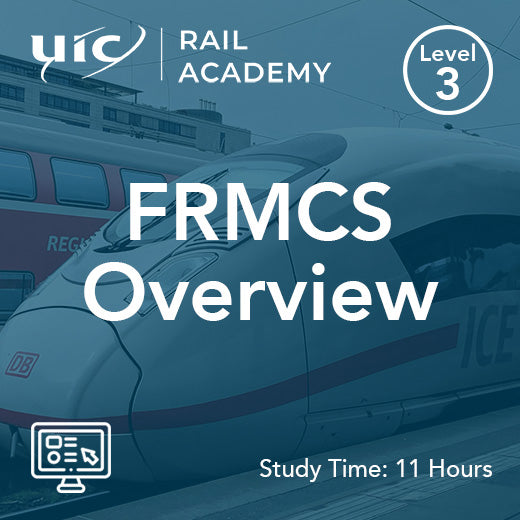
FRMCS V2 Overview (On-Demand)
This course is aimed at non-technical people or those in management roles that need an introduction to FRMCS. It outlines the need for FRMCS and introduces the standards that are required. The course also discusses the issues with the current radio spectrum allocations and how FRMCS and GSM-R may co-exist in the rollout phase. Also discussed the technology known as 5G that will be an integral part of FRMCS. Now fully updated to include FRMCS V2 specifications Part of UIC Rail Academy Course Contents FRMCS – An Introduction FRMCS Reference Architecture 5G Mission Critical Architecture and Procedures Radio Planning and Migration MCVideo Certified by Institution of Railway Signal Engineers (IRSE) The Institution of Railway Signal Engineers (IRSE) certifies that the syllabus for the FRMCS Overview course is appropriate for meeting the stated objectives of that course. For more information about the scope of the certification process provided by the IRSE please see the IRSE website www.irse.org. Also available as an instructor-led course, learn more
£1,218.00
-
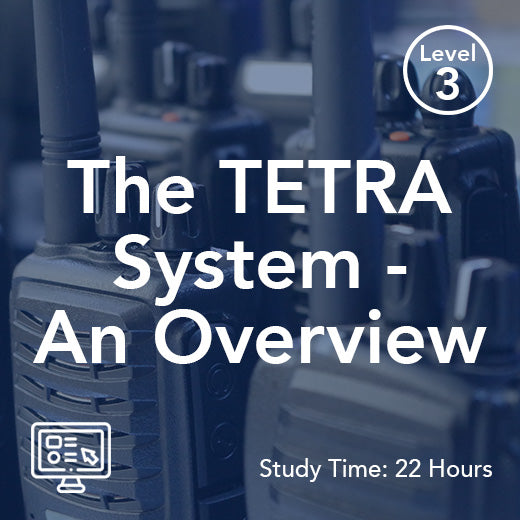
The TETRA System - An Overview (On-Demand)
This course provides a technical overview of the TETRA system – both Trunked Mode Operation (TMO) and Direct Mode Operation (DMO). The course commences with a look at the ETSI technical specifications that define TETRA and the general requirements of users of Professional Mobile Systems. The course moves on to examine the range of services that TETRA is capable of delivering, and the network elements, architecture and functionality required to deliver these services. The air interface structure and associated protocol stack are then explained in some detail, along with mobility management procedures such as cell selection and re-selection. The philosophy of trunked radio networks is also explored, and the benefits of trunking are explained, along with a look at capacity planning. The course finishes with an explanation of the steps taken to make the air interface as secure as possible – including authentication and encryption. This course is an ideal foundation for further study as it provides a solid understanding of TETRA, whilst also highlighting the flexibility and sophistication of this technology. Who would benefit Those working or involved in PMR or PAMR who need to understand TETRA technology, specification and capabilities. Prerequisites Familiarity with the architecture and general operation of typical VHF or UHF mobile networks is advantageous, and some understanding of radio techniques is useful. Topic Areas Include: Introduction to TETRA TETRA Services TETRA Network Components TETRA Network Architecture and Functionality Air Interface Radio Procedures TETRA System Capacity Direct Mode Operation (DMO) Security Aspects of TETRA On-Demand Online Training Our self-paced on-demand distance learning programmes are accessible on any computer, tablet or smartphone and allow you to study at a time and location that is convenient to you. Each course includes: Illustrated Course Books - featuring leading edge knowledge from subject matter experts. Videos - Detailed videos expand the points covered in the course books, discussing topics in greater depth. Tutor Support – Dedicated course tutors are available to answer any questions you might have throughout your studies. Formative Assessment - Modules include regular quizzes to support learning by testing your knowledge of the subject matter. Certification– Successfully complete the end of module tests to earn Digital Badges to demonstrate the depth of your knowledge of the topic. Also available as a Live Online Training Programme, learn more.
£1,815.00
-

Mini MBA – Digital and Connected Technology
Businesses that are transitioning to, or are underpinned by digital and connected technology face a unique set of challenges compared to traditional organisations. As companies move into new areas of development and operation, it is critical that management teams across the organisation embrace the fast pace of change and realignment - whilst continuing to maximise their existing opportunities. The goal is an agile and flexible organisation that is aligned on strategic imperatives, fully focused on customer requirements and the value-exchange, and with an enhanced ability to collaborate and partner within complex ecosystems.This programme is designed to provide an excellent foundation on which senior managers can fast-track their competency development within the relevant areas. We take a comprehensive look at the business environment, industry trends and drivers, technologies and frameworks, financial aspects if digital and hi-tech, customer proposition, strategy, business models and positioning – and critically, at how it all fits together.Participants will significantly enhance their capabilities in terms of strategy-setting and alignment, evaluation and decision-making, business model development, alignment of departments and teams to strategic imperatives, and people / culture development. Delivery and Programme Schedule: Group Work, Business Simulation and Case Studies: These run throughout the programme and are designed to enable participants to explore and share ideas, identify best practice, build confidence, and develop a shared view of a future position. Focused Modules: Hi-Tech - Business Environment and Use Cases Digital and Connected Technologies Explained Finance for Hi-Tech Business Models Innovation – Methods and Innovation Sprint Strategy, Business Models and the Customer Proposition This programme is aimed at: Senior or (aspiring senior) managers involved in hi-tech industries that are underpinned by digital and connected technology Those who need to rapidly build their knowledge and competencies in order to maximise their contribution to their organisation, and to lead their team(s) effectively. Those working with, or making decisions that are impacted by emerging opportunities and trends within hi-tech industries. Management teams – enabling a candid and hard-hitting evaluation of the status quo, alignment of ideas, and development of a shared future vision For pricing options contact us on: info@wraycastle.com
POA: Private Course
-

Fibre Optic Introduction
Our Fibre Optic Introduction course is designed to provide participants with a solid foundation in fibre optics, covering both the advantages and challenges associated with this technology. Throughout the course, attendees will gain an understanding of the fundamentals of light, fibre optic basics, key building blocks and equipment, as well as the deployment process. From the nature of light and light propagation to optical cables and splice closures, this course offers a comprehensive overview of fibre optics. With a focus on practical applications and real-world scenarios, this course equips participants with the knowledge and skills needed to successfully deploy fibre optic networks. Whether you are new to the field of telecommunications or looking to enhance your understanding of fibre optics, this course is suitable for individuals at all levels of experience. Course Contents Fibre Optic Networks: Building Blocks Fundamentals of Light Propagation Fibre Optic Basics Optical Cable Types and Applications Fusion and Mechanical Splicing Optical Connectors and Fibre Termination Passive Optical Components Active Optical Components Fibre Optic Networks Fibre Optic Networks: Testing and Troubleshooting Connector Inspection and Cleaning Optical Power Meter and Light Source Optical Time Domain Reflectometer Optical Network Troubleshooting Safety Best Practices
£980.00
-
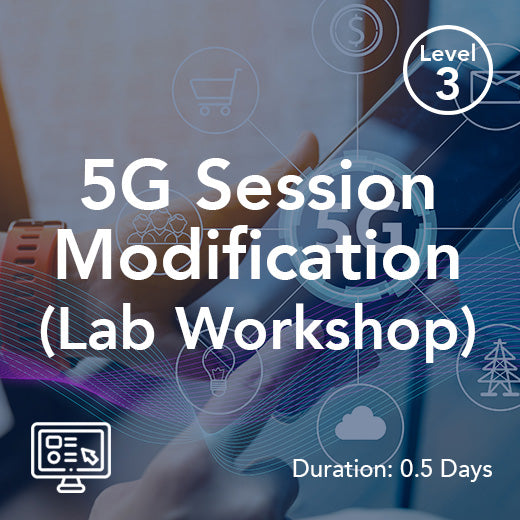
5G Session Modification (Lab Workshop)
This 1/2-day lab enables you to develop a deep understanding of the 5G Session Modification Message Flow insights into the intricacies of the modification process The cloud-based labs provides participants with access to a fully emulated 5G System environment. Experiment with the configurations for various Network Functions within the 5G Core Network and build customized settings for signalling scenarios that will enable users to develop greater insight in to the operation of the 5G System. Session Modification Message Flow Develop insights into the intricacies of the modification process, this lab examines: Modifying an existing PDU Session for SSC Modes 2 and 3 Addition and deletion of UPF for User Plane resources UL CL and PFCP message flow Lab Features & Benefits Through a combination of hands-on experience and guided instruction our virtual labs allow users to explore signalling procedures in the 5G system. Our labs feature: A simulated 5G network - Provides hands-on experience and reinforces theoretical knowledge. Guided exercises for signalling scenarios - makes learning and applying new concepts straightforward. Wireshark (pcap) output files – detailed output files provide deep system insight. Cloud-based lab - available 24/7 on any connected device. Individual dedicate server - Ensures that your work is kept private and secure. Ongoing trainer support - ensures you get expert advice when needed. Full integration with Wray Castles training programmes - allows you to build bespoke learning pathways for specialist teams across your organisation. You can find more information on our labs and arranges a demo here.
POA: Private Course
-
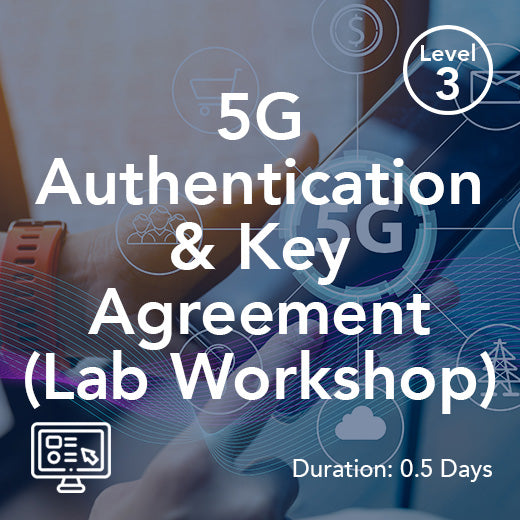
5G Authentication and Key Agreement (Lab Workshop)
This lab enables you to explore the 5G Authentication & Key Agreement procedure with our 1/2-day lab including ciphering key and integrity key generation The cloud-based lab provides participants with access to a fully emulated 5G System environment. Experiment with the configurations for various Network Functions within the 5G Core Network and build customized settings for signalling scenarios that will enable users to develop greater insight in to the operation of the 5G System. 5G Authentication & Key Agreement Examine the 5G AKA procedure including ciphering key and integrity key generation AMF/SEAF signalling towards AUSF using HTTPv2 protocol Usage of SIDF in UDM ARPF and its usage for creation of Authentication Vector Lab Features & Benefits Through a combination of hands-on experience and guided instruction our virtual labs allow users to explore signalling procedures in the 5G system. Our labs feature: A simulated 5G network - Provides hands-on experience and reinforces theoretical knowledge. Guided exercises for signalling scenarios - makes learning and applying new concepts straightforward. Wireshark (pcap) output files – detailed output files provide deep system insight. Cloud-based lab - available 24/7 on any connected device. Individual dedicate server - Ensures that your work is kept private and secure. Ongoing trainer support - ensures you get expert advice when needed. Full integration with Wray Castles training programmes - allows you to build bespoke learning pathways for specialist teams across your organisation. You can find more information on our labs and arranges a demo here.
POA: Private Course
-
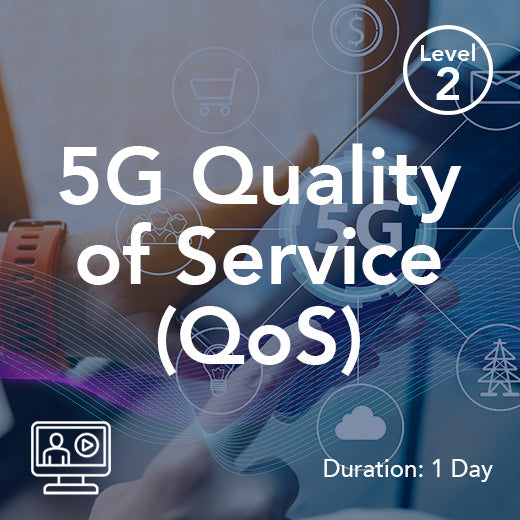
5G Quality of Service (QoS)
This course is designed for those involved in the QoS and charging management and operations in 5G Standalone Networks Prerequisites The focus of this course is only on the PCC framework as specified by 3GPP thus participants should be familiar with 5G operations and general features prior to attending this training. Course Contents 5G PCC Framework Architecture 5G QoS Model Access and Mobility Association Session Management Policy Association AF Influence on Policy Decisions PCF Selection PCC Rules and PCC Rule handling
POA: Private Course
-
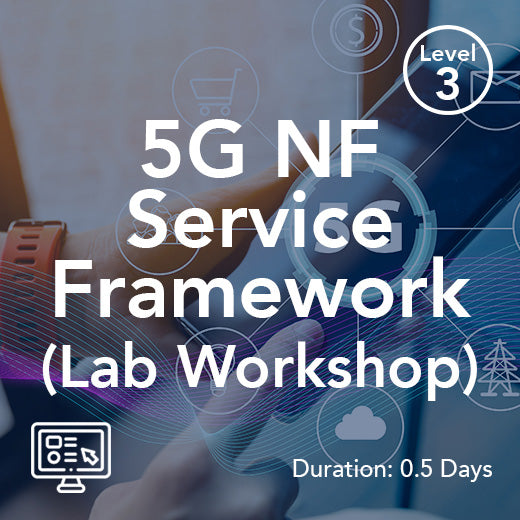
5G NF Service Framework (Lab Workshop)
Develop a deep understanding of the 5G NF Service Framework and analyse the intricacies of 5G Service Based Architecture (SBA) procedures The cloud-based lab provides participants with access to a fully emulated 5G System environment. Experiment with the configurations for various Network Functions within the 5G Core Network and build customized settings for signalling scenarios that will enable users to develop greater insight in to the operation of the 5G System. NF Service Framework Explore the intricacies of SBA procedures, this lab focuses on the procedures used in: SBA for Registration, Discovery, and Service Operations Examining HTTPv2 messages, including JSON-format content Lab Features & Benefits Through a combination of hands-on experience and guided instruction our virtual labs allow users to explore signalling procedures in the 5G system. Our labs feature: A simulated 5G network - Provides hands-on experience and reinforces theoretical knowledge. Guided exercises for signalling scenarios - makes learning and applying new concepts straightforward. Wireshark (pcap) output files – detailed output files provide deep system insight. Cloud-based lab - available 24/7 on any connected device. Individual dedicate server - Ensures that your work is kept private and secure. Ongoing trainer support - ensures you get expert advice when needed. Full integration with Wray Castles training programmes - allows you to build bespoke learning pathways for specialist teams across your organisation. You can find more information on our labs and arranges a demo here.
POA: Private Course
-
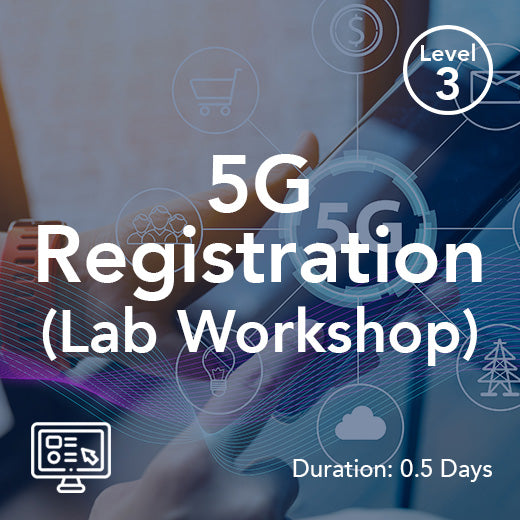
5G Registration (Lab Workshop)
Deep dive into the 5G Registration Message Flow, analyse the output (via Wireshark pcap files) and gain a comprehensive understanding of the 5G registration protocol. The cloud-based lab provides participants with access to a fully emulated 5G System environment. Experiment with the configurations for various Network Functions within the 5G Core Network and build customized settings for signalling scenarios that will enable users to develop greater insight in to the operation of the 5G System. Registration Message Flow Gain a comprehensive understanding of the 5G registration protocols including: Message flows for 5G-AKA Subscriber Data Management PCF Interaction Signalling by NAS, NGAP, and HTTPv2 protocols. Lab Features & Benefits Through a combination of hands-on experience and guided instruction our virtual labs allow users to explore signalling procedures in the 5G system. Our labs feature: A simulated 5G network - Provides hands-on experience and reinforces theoretical knowledge. Guided exercises for signalling scenarios - makes learning and applying new concepts straightforward. Wireshark (pcap) output files – detailed output files provide deep system insight. Cloud-based lab - available 24/7 on any connected device. Individual dedicate server - Ensures that your work is kept private and secure. Ongoing trainer support - ensures you get expert advice when needed. Full integration with Wray Castles training programmes - allows you to build bespoke learning pathways for specialist teams across your organisation. You can find more information on our labs and arranges a demo here.
POA: Private Course
-
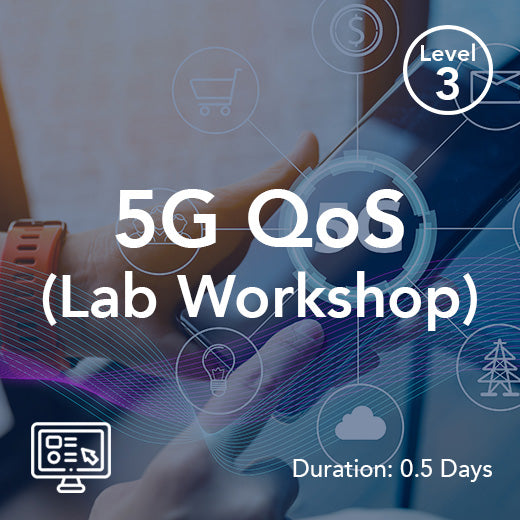
5G QoS (Lab Workshop)
Examine details of AM Policy and SM Policy associations created during registration and PDU Session Establishment with our 1/2-Day Virtual Lab. The cloud-based lab provides participants with access to a fully emulated 5G System environment. Experiment with the configurations for various Network Functions within the 5G Core Network and build customized settings for signalling scenarios that will enable users to develop greater insight in to the operation of the 5G System. 5G QoS Explore details of AM Policy and SM Policy associations created during registration and PDU Session Establishment 5G QoS model and details of QoS profile(s) and QoS rule(s) PCF and PCC rule(s) details Walk through of QoS parameters handling in 5G (5QI, ARP, MFBR, GFBR and AMBR) Lab Features & Benefits Through a combination of hands-on experience and guided instruction our virtual labs allow users to explore signalling procedures in the 5G system. Our labs feature: A simulated 5G network - Provides hands-on experience and reinforces theoretical knowledge. Guided exercises for signalling scenarios - makes learning and applying new concepts straightforward. Wireshark (pcap) output files – detailed output files provide deep system insight. Cloud-based lab - available 24/7 on any connected device. Individual dedicate server - Ensures that your work is kept private and secure. Ongoing trainer support - ensures you get expert advice when needed. Full integration with Wray Castles training programmes - allows you to build bespoke learning pathways for specialist teams across your organisation. You can find more information on our labs and arranges a demo here.
POA: Private Course
-

AF Influence on Traffic Routing (Lab Workshop)
The Lab allows you to analyse, test and understand the Influencing Traffic-Routing initiated by an AF and the details of traffic routing to develop a deep understanding of the protocols involved. The cloud-based lab provides participants with access to a fully emulated 5G System environment. Experiment with the configurations for various Network Functions within the 5G Core Network and build customized settings for signalling scenarios that will enable users to develop greater insight in to the operation of the 5G System. AF Influence on Traffic Routing Message Flow Explore the Influencing Traffic-Routing initiated by an AF and the intricacies of traffic routing to develop a comprehensive understanding of the protocols involved: AF/P-CSCF PCF and SM Policy Control Analyses of the SMF behaviour Signalling done by HTTPv2 and PFCP protocols. Lab Features & Benefits Through a combination of hands-on experience and guided instruction our virtual labs allow users to explore signalling procedures in the 5G system. Our labs feature: A simulated 5G network - Provides hands-on experience and reinforces theoretical knowledge. Guided exercises for signalling scenarios - makes learning and applying new concepts straightforward. Wireshark (pcap) output files – detailed output files provide deep system insight. Cloud-based lab - available 24/7 on any connected device. Individual dedicate server - Ensures that your work is kept private and secure. Ongoing trainer support - ensures you get expert advice when needed. Full integration with Wray Castles training programmes - allows you to build bespoke learning pathways for specialist teams across your organisation. You can find more information on our labs and arranges a demo here.
POA: Private Course
-
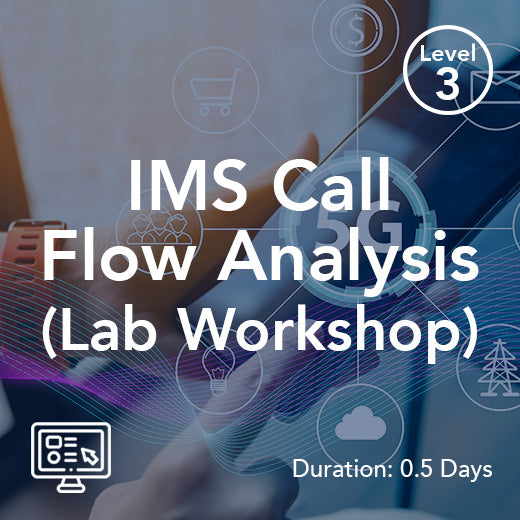
IMS Call Flow Analysis (Lab Workshop)
Examine details of IMS Call Flow Analysis with focuses on IMS Registration and Invitation procedures with our 1/2-Day Virtual Lab. The cloud-based lab provides participants with access to a fully emulated 5G System environment. Experiment with the configurations for various Network Functions within the 5G Core Network and build customized settings for signalling scenarios that will enable users to develop greater insight in to the operation of the 5G System. IMS Call Flow Analysis Focuses on IMS Registration and Invitation procedures includes: SIP routing within the IMS domain Detailed information about SDP for IMS Session setup Lab Features & Benefits Through a combination of hands-on experience and guided instruction our virtual labs allow users to explore signalling procedures in the 5G system. Our labs feature: A simulated 5G network - Provides hands-on experience and reinforces theoretical knowledge. Guided exercises for signalling scenarios - makes learning and applying new concepts straightforward. Wireshark (pcap) output files – detailed output files provide deep system insight. Cloud-based lab - available 24/7 on any connected device. Individual dedicate server - Ensures that your work is kept private and secure. Ongoing trainer support - ensures you get expert advice when needed. Full integration with Wray Castles training programmes - allows you to build bespoke learning pathways for specialist teams across your organisation. You can find more information on our labs and arranges a demo here.
POA: Private Course
-
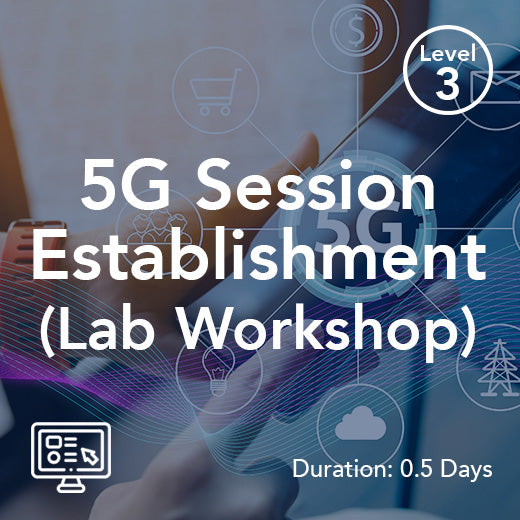
5G Session Establishment (Lab Workshop)
Deep dive into the 5G Session Establishment Procedure and User Plane Resource setup, analyse the output (via Wireshark pcap files) and gain a comprehensive understanding of the 5G Session Establishment Procedure. The cloud-based lab provides participants with access to a fully emulated 5G System environment. Experiment with the configurations for various Network Functions within the 5G Core Network and build customized settings for signalling scenarios that will enable users to develop greater insight in to the operation of the 5G System. Session Establishment Message Flow Get hands-on experience of Session Establishment Procedure and User Plane Resource setup including: PFCP Signalling towards the UPF, using PFCP protocol 5GSM signalling details Lab Features & Benefits Through a combination of hands-on experience and guided instruction our virtual labs allow users to explore signalling procedures in the 5G system. Our labs feature: A simulated 5G network - Provides hands-on experience and reinforces theoretical knowledge. Guided exercises for signalling scenarios - makes learning and applying new concepts straightforward. Wireshark (pcap) output files – detailed output files provide deep system insight. Cloud-based lab - available 24/7 on any connected device. Individual dedicate server - Ensures that your work is kept private and secure. Ongoing trainer support - ensures you get expert advice when needed. Full integration with Wray Castles training programmes - allows you to build bespoke learning pathways for specialist teams across your organisation. You can find more information on our labs and arranges a demo here.
POA: Private Course
-
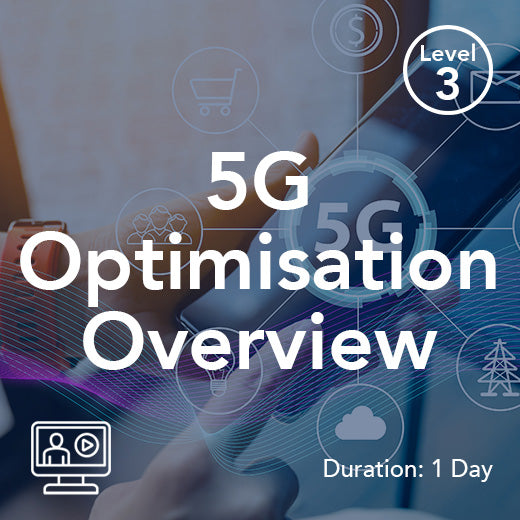
5G Optimisation Overview
Course Code: FG2305 An introduction to the principles of parameter setting and optimisation in the Next Generation Radio Access Network (NG-RAN). The material covered includes cell configuration, signal measurements, and parameters in idle and connected mode. Who Would Benefit? This course is intended for experienced radio access optimisers, and for those involved with device development or functionality testing in 5G systems. Prerequisites The course assumes an engineering background, with some knowledge of digital radio systems in general and the 5G air interface in particular. Experience of parameter tuning and optimisation for LTE would be useful. Course Contents Fundamentals of the 5G Air Interface RSRP, RSRQ and SINR Parameter Setting
POA: Private Course
-
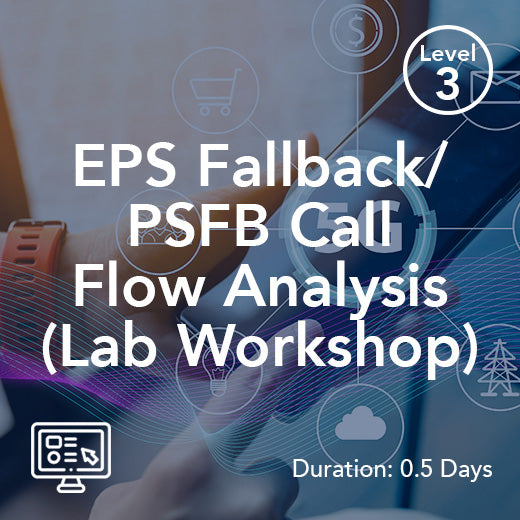
EPS Fallback/PSFB Call Flow Analysis (Lab Workshop)
Deep dive into the EPS Fallback / PSFB Call Flow Analysis and gain a comprehensive understanding sage of the N26 interface for VoNR session handover from 5G to 4G. The cloud-based lab provides participants with access to a fully emulated 5G System environment. Experiment with the configurations for various Network Functions within the 5G Core Network and build customized settings for signalling scenarios that will enable users to develop greater insight in to the operation of the 5G System. EPS Fallback / PSFB Call Flow Analysis Focusing on the usage of the N26 interface for VoNR session handover from 5G to 4G. It provides end-to-end signalling flow and examines protocols such: 4G/5G-NAS, GTP-c, DIAMETER, PFCP & HTTPv2 Lab Features & Benefits Through a combination of hands-on experience and guided instruction our virtual labs allow users to explore signalling procedures in the 5G system. Our labs feature: A simulated 5G network - Provides hands-on experience and reinforces theoretical knowledge. Guided exercises for signalling scenarios - makes learning and applying new concepts straightforward. Wireshark (pcap) output files – detailed output files provide deep system insight. Cloud-based lab - available 24/7 on any connected device. Individual dedicate server - Ensures that your work is kept private and secure. Ongoing trainer support - ensures you get expert advice when needed. Full integration with Wray Castles training programmes - allows you to build bespoke learning pathways for specialist teams across your organisation. You can find more information on our labs and arranges a demo here.
POA: Private Course
-
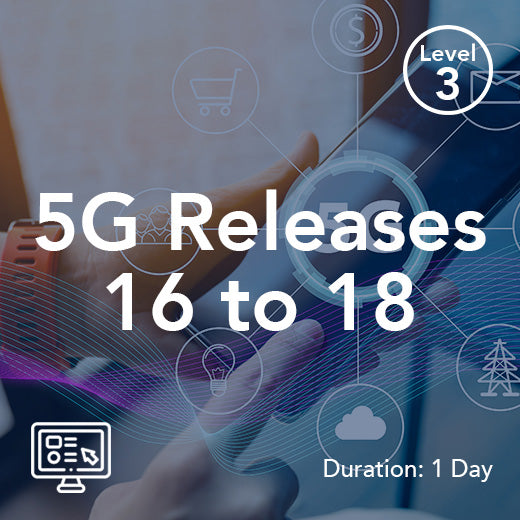
5G Releases 16 to 18
This 1/2-day course provides an overview of the latest advancements in 5G technology, specifically focusing on Releases 16, 17, and 18. Participants will gain insight into the enhanced capabilities of 5G and 5G-Advanced, covering topics such as Vehicle-to-Everything (V2X) services, Integrated Access and Backhaul (IAB), Non-Terrestrial Networks (NTNs), Machine Type Communications (MTC), and the Industrial Internet of Things (IIoT). This course is designed to keep engineers up-to-date with the evolving landscape of 5G technology. Engineers looking to expand their knowledge and understanding of 5G technology would greatly benefit from this course. It is ideal for individuals who are already familiar with mobile telecommunication systems and have a basic understanding of 5G Release 15. By completing this course, participants will be equipped with the necessary knowledge to navigate the complexities of 5G technology and stay ahead in this rapidly evolving industry. Who would benefit The course is intended for engineers who require an up-to-date knowledge of the capabilities of 5G. Prerequisites The course assumes familiarity with mobile telecommunication systems and a basic understanding of 5G Release 15.
POA: Private Course
-
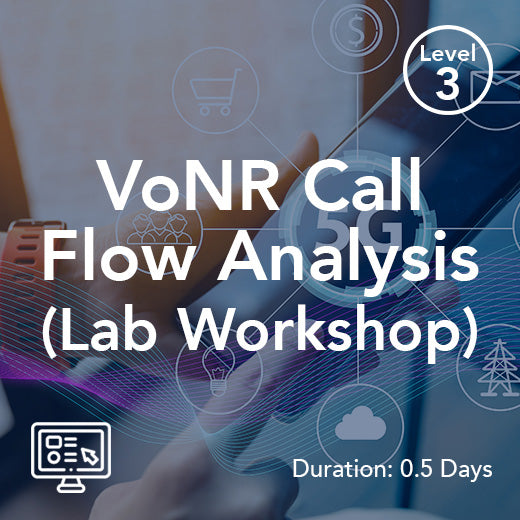
VoNR Call Flow Analysis (Lab Workshop)
Develop a deep understanding VoNR Call Flow and understand its role in the 5G Standalone Network with this 1/2-day Lab. The cloud-based lab provides participants with access to a fully emulated 5G System environment. Experiment with the configurations for various Network Functions within the 5G Core Network and build customized settings for signalling scenarios that will enable users to develop greater insight in to the operation of the 5G System. VoNR Call Flow Analysis Covering Voice over New Radio in a 5G SA network, it includes message flows for: Registration PDU session setup IMS and SIP signalling for VoNR Lab Features & Benefits Through a combination of hands-on experience and guided instruction our virtual labs allow users to explore signalling procedures in the 5G system. Our labs feature: A simulated 5G network - Provides hands-on experience and reinforces theoretical knowledge. Guided exercises for signalling scenarios - makes learning and applying new concepts straightforward. Wireshark (pcap) output files – detailed output files provide deep system insight. Cloud-based lab - available 24/7 on any connected device. Individual dedicate server - Ensures that your work is kept private and secure. Ongoing trainer support - ensures you get expert advice when needed. Full integration with Wray Castles training programmes - allows you to build bespoke learning pathways for specialist teams across your organisation. You can find more information on our labs and arranges a demo here.
POA: Private Course
-
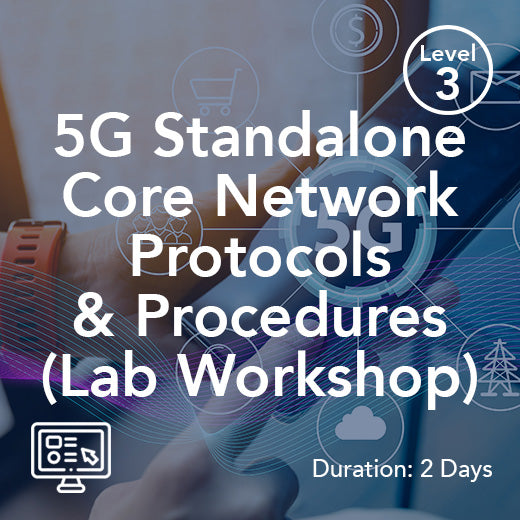
5G Standalone - Core Network Protocols and Procedures (Lab Workshop)
Deep dive into 5G Standalone Core Network Protocols and Procedures with this lab workshop. The lab workshop includes a mix of theory and hands-on exercises and includes a detailed guide covering exercises on various protocols and signalling scenarios in 5G System. The focus of the lab is the 5G Core Network with extensive coverage of the Service Based Architecture and HTTPv2 including JSON. Furthermore all protocols around the 5G Core Network are examined (PFCP, NGAP and 5G NAS). The cloud-based lab provides participants with access to a fully emulated 5G System environment. Experiment with the configurations for various Network Functions within the 5G Core Network and build customized settings for signalling scenarios that will enable users to develop greater insight in to the operation of the 5G System. Topic Areas Include: Protocols: 5G NAS: 5GMM & 5GSM NGAP SBA and HTTPv2 JSON PFCP GTP-u Signalling Procedures: Registration Deregistration PDU Session GUTI Registration Service Request Paging Xn Handover N2 Handover UL CL – Uplink Classifier Lab Features & Benefits Through a combination of hands-on experience and guided instruction our virtual labs allow users to explore signalling procedures in the 5G system. Our labs feature: A simulated 5G network - Provides hands-on experience and reinforces theoretical knowledge. Guided exercises for signalling scenarios - makes learning and applying new concepts straightforward. Wireshark (pcap) output files – detailed output files provide deep system insight. Cloud-based lab - available 24/7 on any connected device. Individual dedicate server - Ensures that your work is kept private and secure. Ongoing trainer support - ensures you get expert advice when needed. Full integration with Wray Castles training programmes - allows you to build bespoke learning pathways for specialist teams across your organisation. You can find more information on our labs and arranges a demo here.
£1,815.00





























































